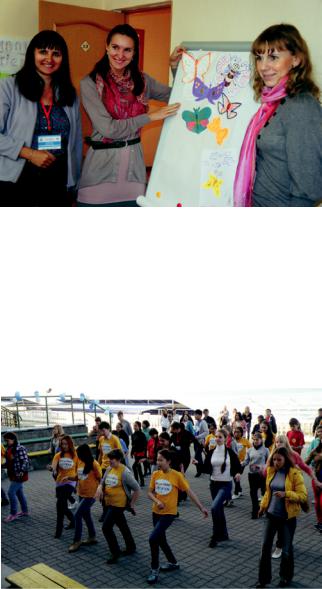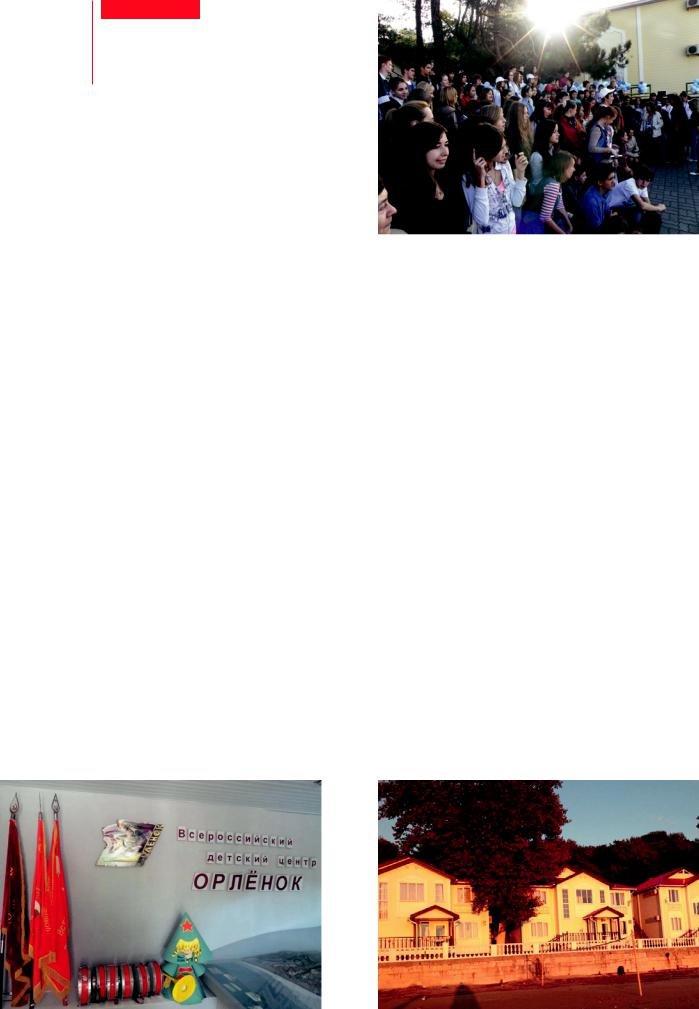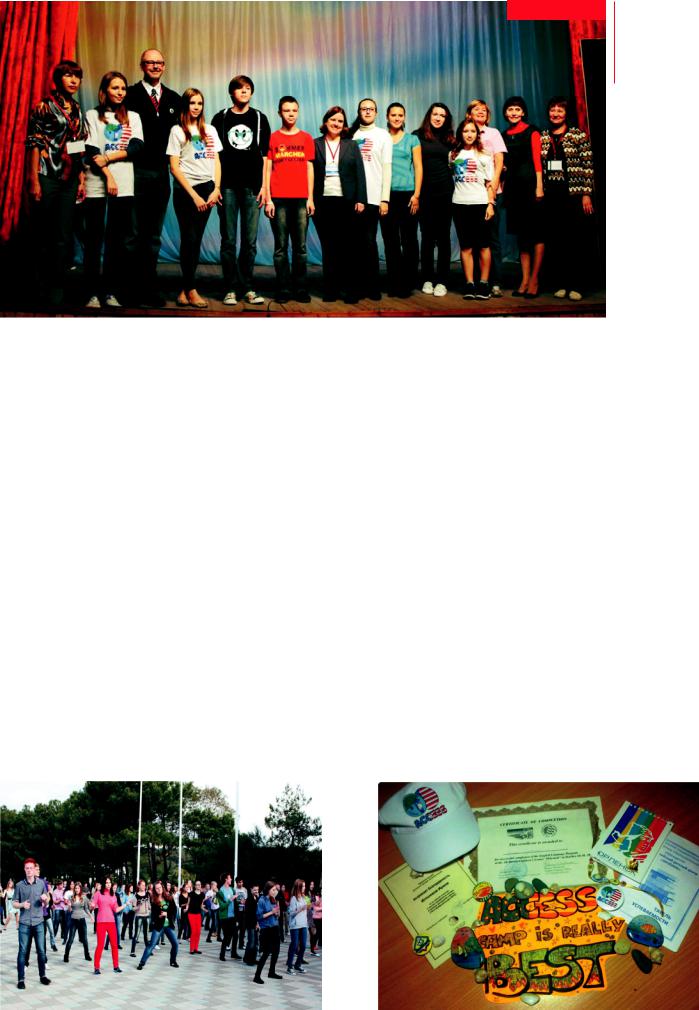
- •NEWS IN BRIEF
- •TEXTS FOR READING
- •London’s Newest Attraction and Symbol of Confidence
- •Impostor
- •METHODS OF TEACHING
- •CLASSROOM ACTIVITIES
- •English Club
- •CREATIVE WRITING
- •Hobbies Differ Like Tastes
- •FOCUS ON LANGUAGE
- •Crossword “Hobbies”
- •DISCOVERING THE PAST
- •Test Your Knowledge
- •LESSON PLANS
- •TOPICAL JOURNEY
- •Leisure Time in the Past
- •English Words and phrases for Free Time and Hobbies
- •Collecting as a Hobby
- •Interesting Facts
- •Creative Hobbies
- •Types of Hobbies
- •Popular Hobbies
- •Hobbies in Books
- •SCHOOL THEATRE
- •The Little Prince
- •PREPARING FOR EXAMS
- •My Hobbies
- •TESTS
- •Five-Minute Tests
- •FOR YOUNG LEARNERS
- •Primary School Olympiad
- •GOOD NEWS
- •YOUTH ENGLISH SECTION

|
GOOD NEWS |
|
English |
ENGLISH ACCESS |
|
53 |
|
|
|
||
MICROSCHOLARSHIP PROGRAM |
April 2013 |
||
ACCESS is the acronym for ACTIVE, CREATIVE, CONFIDENT, ENERGETIC, SUPPORTIVE, SPECIAL
The purpose of the English Access Microscholarship Program (ACCESS program) is to make the study of English language more accessible to adolescents from an economically disadvantaged background. In addition, while working on their language skills, the participants will become familiar with aspects of US culture. The acquired language skills enable the teenagers to take advantage of opportunities that had previously been unavailable to them.
The participants are 15–16 year old students who usually study English for a period of two years: each student receives 128 hours of instructions per year, consisting of 4 hours per week for a total of 32 weeks, plus 72 hours of intensive twoweek summer program each year.
ACCESS program sites are located in 21 cities all over Russia.
The curriculum includes the following modules: Communicative English, American Culture, English through Computers, English through Video and Movies, Communicative Grammar, English through Songs and Games, American History through Visual Arts, English through Sports, English through Arts and Crafts, Leadership Training and Community Service Projects. The ACCESS curriculum also includes topics of interest related to the subjects taught at school, such as Geography, History, Biology, Art, etc.
Annual ACCESS camp is usually hosted by the Russian Children’s Center “Orlyonok”. This year’s ACCESS camp on the Black Sea coast brought together 90 kids from 9 cities. On October 25–28, 2012, the presentation of the ACCESS program was the highlight of the conference organized by professional associations of the teachers of English language (Umbrella NATE). The conference participants saw ACCESS kids having the time of their lives performing, doing artwork, and generally developing their English language and cross-cultural skills. This was the most inspiring and rewarding part of the conference for every teacher involved in these efforts.
Just imagine a peaceful place with sandy beaches and sun-lit wooded hills. One of Orlyonok’s oldest camps called “Solnechny” is situated here. It has a long history of developing creative potential and leadership skills of several generations of children.
Here is an overview of only one English class which took place in “Solnechny”. Children from Ufa, Stavropol, Salavat, Gubkin and other towns were in one group under the guidance of a teacher from Rostov-on-Don. During the lesson they discusstd what kind of person a real friend should be. All stages of the lesson had activities which were closely connected with tolerance. They combined English grammar and vocabulary studies as well as fun. First, the students performed a traditional folk song “Auld Lang Syne” and discussed Robert Burns’s original verse about long-standing friendships. Next, they demonstrated their communication skills introducing themselves in a game. Grammar and vocabulary practice was followed by reading a text about but-
terflies. Then everybody sang along “You and me and me and you” both in Russian and English. It proved that all people need a friend, even those who live on some other planets. There were lyrics like this: “Maybe by the violet river there are some lonely people who are sad and eager to see us”… Finally, everyone crafted a paper butterfly which symbolized beauty, brightness and fragility of friendship. The paper butterflies were placed on a poster. The students really enjoyed the activities and showed good progress in English language studies.
In one of the classrooms in “Solnechny” camp: When the students presented their poster, they emphasized that most of all they needed to be free and loved.
ACCESS Program is unique because it focuses on highly motivated students from economically under-privileged families. There is a hope that the idea will inspire more Russian teachers to implement similar programs in their local schools. For some ideas please read: http://www.eltrussia.ru/ articles_22.html.
Every morning ACCESS program children get together outside their “Solnechny” camp. They discuss their daily activities and dance for a warm-up.
They always cheer with words like “Good job!”or “ACCESS students are the best!”
By Irina Ishkhneli, School No. 1738, Moscow
Photo: http://donelta.ning.com

English GOOD NEWS
54 SOLNECHNY CAMP
April 2013
IS REALLY THE BEST!
October 2012 was full of events for a group of 11 students from Chelyabinsk who had a chance to spend 3 weeks in the All-Russia Children’s Center “Orlyonok” where they were taught English on the American program “Access”.
The English Access Microscholarship Program was run in Chelyabinsk in 2011. It provides a foundation of English language skills to economically disadvantaged 14-18-year-olds through 2 years of intensive sessions. Additional criteria for students selection are handicapped parent(s) or applicant, an incomplete family, a many-children-family. Nowadays there are three groups of students who are lucky to participate in this program. Four teachers are supposed to conduct classes: an EL Fellow (native speaker), an IT linguistic specialist, and two Russian experts. Students attend afterschool classes. They also do the Internet course “IT English”.
The distant learning course “IT English” is supported by some American books, and VOA website. The goals of the course are developing of socio-cultural competence of students; their tolerance towards people of different cultures and open-mindedness and improvement of computer skills. The course outline contains topics relating to US culture and values such as: U.S. History, Famous Americans, American Holidays, American Idioms, etc. The course is still being designed, so some new topics will be included into the syllabus (U.S. Education, U.S. Popular Culture, The Environment, etc.). At the end of the modules students are engaged in the project work.
Summer camps are an essential part of the program. This Autumn Camp in “Orlyonok” was the experience of a lifetime. Access teachers tried to insure a highly motivating learning environment for all students through language games, team-building activities, video films, songs, and dances. Teachers with children took an active part in the “Umbrella” conference of English teachers having given open classes to its participants representing 40 regions and 32 educational establishments all over Russia. At the end of the program Certificates of successful completion of the English Language Program at the All-Russia Children’s Center “Orlyonok” in October 10–30, 2012 were awarded to students by ELO Frances Westbrook.
Our students have lots of fond memories about these holidays in “Orlyonok”.
“Orlyonok” is a place with its own traditions and atmosphere of friendliness. We enjoyed the wonderful sunsets, amazing nature. I think “Orlyonok” is the greatest camp I’ve ever been to.
Victoria Nurgalieva
We lived in the oldest camp of “Orlyonok” called “Solnechny”. There were 10 groups in our camp, 30 children in each company. Our group was crazy and fun.
Valentina Almakayeva
We didn’t have free time. We were always engaged in various activities. The most enjoyable competition was a touristtrail. We went to the mountains. Our group was the best.
Yuliya Savateyeva
These were the most wonderful three weeks of autumn. Every day we had fascinating English lessons with teachers from different cities and with Erik Lundell. The trip to Novorossiysk was incredibly interesting and informative. We visited the Malaya Zemlya Memorial and the port of the coast guard ships. I really enjoyed this excursion. Love and miss all!
Irina Igosheva
My first day in “Orlyonok” was very boring. I felt nervous. The situation changed as soon as we started to participate in many global projects. I’d like to visit “Orlyonok” once more in the future.
Daniil Bolotnikov

GOOD NEWS English
55
April 2013
It was an amazing trip! I couldn’t even imagine that “Orlyonok” was such an awesome place. We had a lot of fun. Every day we took part in different activities: concerts, shows and competitions. We won lots of prizes. We also had English lessons taught by eight English teachers from eight cities of our country and by Erik Lundell. We sang famous English pop music songs and danced special kind of American dances. I’ve learnt a lot about the American culture. All the lessons were very amusing. I’ve never thought that Russia is so multicultural! I’m still keeping in touch with girls from Buryatia, Tuva and Kalmykia. I was very upset when we were leaving the camp. I cried my eyes out.
Nastya Krasnykh
I’m very thankful to “ACCESS” for the opportunity to spend three weeks in All-Russia Children’s Center “Orlyonok”.
Denis Gladyshev
“Orlyonok” met my expectations.
Valera Anisimov
The change was cool!!! It was my first camp, and I was astonished. Our group has become the second family for me. It was hard for all of us to leave “Orlyonok” and say goodbye to each other. But the guys with whom I made friends
there, our counselors will forever remain in my memory and heart.
Lena Petrenko
When I was offered to work in “Orlyonok”, it was my lucky break. I decided to take a chance. Without exaggeration, “Orlyonok” opens a door for every child, creates opportunities for discovering and developing their talents, helps to overcome insecurities about abilities involving children in leadership and social action programs. Teachers faced a challenge to teach a new multicultural group of students every day. To tell the truth, it was exciting. Thanks to the program, we had a real possibility to share ideas and materials with colleagues. Undoubtedly, I have refreshed and enriched my teaching methods. We are grateful to the administration of the camp for insuring nice living and working conditions. I’d like to address my special thanks to president of CHELTA Svetlana Vladimirovna Sannikova for supporting professional development in our city. The fact that I worked in this tremendous town of childhood, which is situated in a healthy and marvelous environment, is my claim to fame.
Tatiana Osintseva, IT Linguistic Specialist, The English Access Microscholarship Program, Chelyabinsk Photo taken by the author
